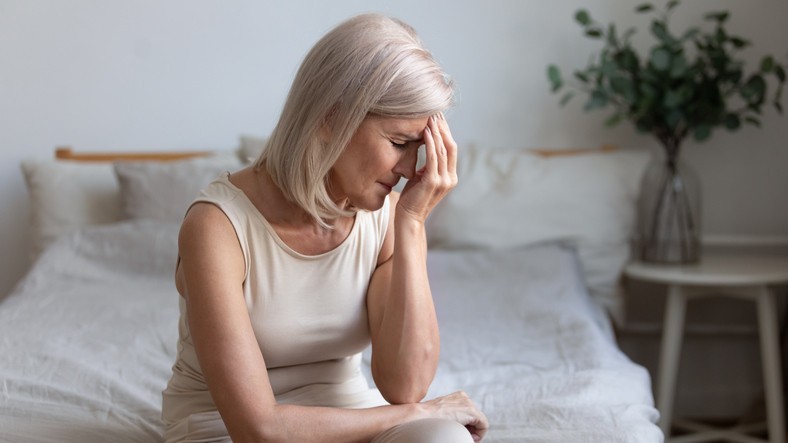It’s a surprisingly common experience: you stand up from sitting or lying down, and suddenly, the world spins a little. This fleeting dizziness, often referred to medically as orthostatic hypotension, happens when your blood pressure drops suddenly upon standing. While it can be alarming, understanding why it occurs and when to be concerned can help you manage this common condition.
 Older woman sitting on a bed experiencing morning dizziness, highlighting orthostatic hypotension
Older woman sitting on a bed experiencing morning dizziness, highlighting orthostatic hypotension
Orthostatic hypotension, also known as postural hypotension, is characterized by a temporary dip in blood pressure when you transition from a seated or reclined position to standing. This happens because gravity causes blood to pool in your legs. Normally, your body quickly compensates for this shift by squeezing blood vessels in your legs and increasing your heart rate to maintain blood flow to the brain. However, when this compensation doesn’t happen effectively, it leads to that dizzy or lightheaded feeling.
This phenomenon is quite prevalent, especially as we age. Studies suggest that up to 20% of individuals over the age of 65 experience orthostatic hypotension to some degree. While occasional, brief episodes lasting less than 15 seconds are usually not a cause for major concern, persistent or severe dizziness can be a sign of an underlying issue and increases the risk of falls.
Common Causes of Dizziness When Standing
Several factors can contribute to orthostatic hypotension and explain why you might feel dizzy when standing up:
- Dehydration: Blood is largely composed of water. When you are dehydrated, your blood volume decreases, potentially leading to lower blood pressure and dizziness upon standing. This is especially relevant in the morning after sleep, as you naturally lose fluids overnight.
- Medications: Many medications can have blood pressure-lowering effects as a side effect. These include certain blood pressure medications themselves, diuretics, antidepressants, and drugs for Parkinson’s disease. Reviewing your medication list with your doctor is crucial if you experience frequent dizziness.
- Digestion: After eating a meal, particularly a large one, your body diverts blood flow to the digestive system. This can temporarily reduce blood flow elsewhere and potentially lower blood pressure, causing postprandial orthostatic hypotension, or dizziness after eating.
- Prolonged Bed Rest or Sitting: Extended periods of inactivity can weaken the blood vessels’ ability to constrict effectively when you stand up, making you more susceptible to dizziness.
Practical Steps to Minimize Lightheadedness
If you experience mild and infrequent dizziness when changing positions, several lifestyle adjustments can help prevent it:
- Review Your Medications: Discuss your medications with your healthcare provider. They can assess if any of your prescriptions are contributing to your dizziness and consider dosage adjustments or alternatives if appropriate. Never change or stop taking medications without professional medical advice.
- Stay Hydrated: Ensure you are drinking enough fluids throughout the day, especially water. Starting your day with a glass of water can be particularly helpful in counteracting morning dizziness related to overnight fluid loss.
- Stand Up Slowly: Avoid sudden movements. When getting out of bed or a chair, rise gradually. Sit on the edge of the bed for a few moments before standing, allowing your body time to adjust. You can also try clenching your leg muscles before fully standing to help promote blood flow upwards.
- Adjust Eating Habits: If you notice dizziness after meals, try eating smaller, more frequent meals instead of large ones. Limiting your intake of rapidly digested carbohydrates like white bread, white rice, and sugary drinks may also be beneficial as these can cause rapid fluctuations in blood sugar and blood pressure.
- Incorporate Light Exercise: Regular, light physical activity, especially in the morning, can improve blood circulation and help stabilize blood pressure. Avoid prolonged standing or sitting still, as this can exacerbate blood pooling in the legs.
When to Seek Medical Advice
While occasional mild dizziness when standing is often benign, it’s important to consult your doctor if you experience any of the following:
- Frequent or Severe Dizziness: If dizziness occurs often or is intense enough to disrupt your daily activities.
- Prolonged Episodes: If the lightheadedness lasts for more than a few minutes.
- Fainting or Loss of Consciousness: Even momentary loss of consciousness or fainting upon standing is a serious symptom that requires immediate medical evaluation.
- Falls: If dizziness has led to falls or near falls.
Your doctor can properly diagnose the cause of your dizziness, rule out any underlying medical conditions, and recommend appropriate treatment if necessary. While medications are available for orthostatic hypotension, often, lifestyle modifications are sufficient to manage the condition effectively.
Disclaimer: This article provides general information and should not be considered medical advice. Always consult with a qualified healthcare professional for any health concerns or before making any decisions related to your health or treatment.
